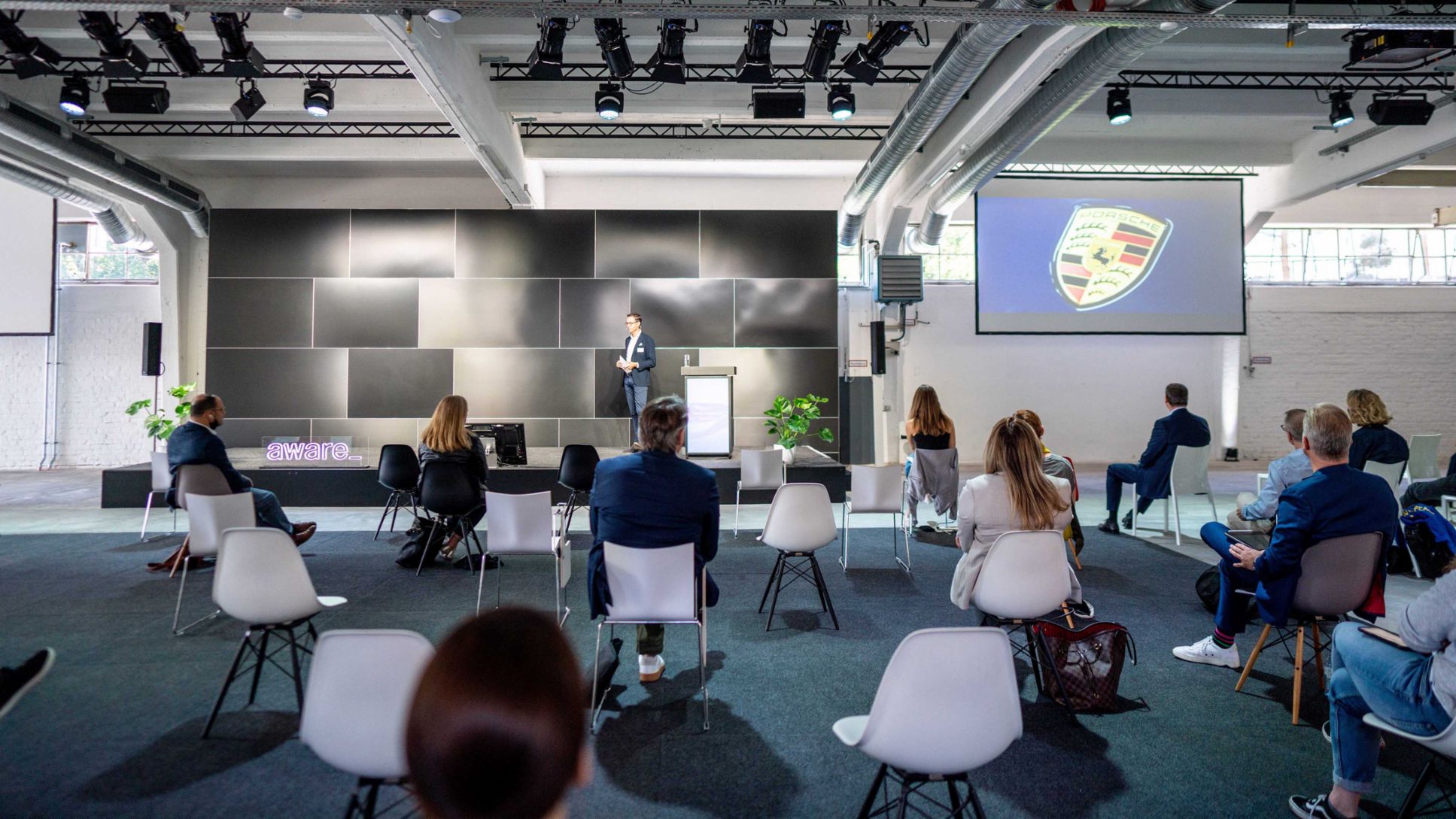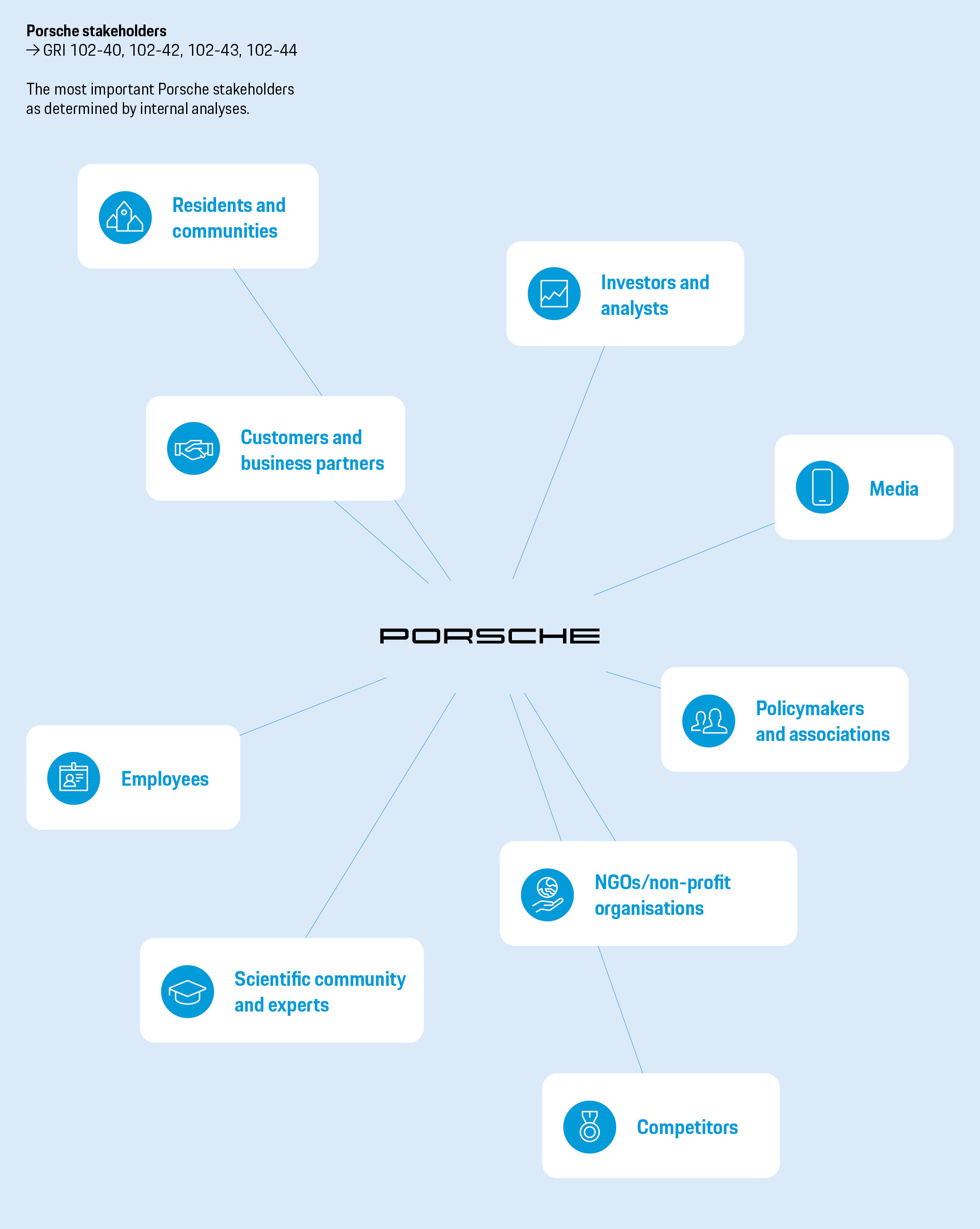Porsche supports the Paris Agreement and welcomes the European Green Deal as a key framework for the future. Porsche’s activities are directed at promoting a Europe that is harmonious, sustain-able and internationally competitive. The European Single Market, cross-border trade, the free movement of workers and the sharing of knowledge determine its competitiveness.
Porsche’s business activities touch on the interests of many people around the world. The company engages in proactive dialogue with its stakeholders and continuously expands this dialogue. Mutual understanding and acceptance can only be established on the basis of the open and transparent exchange of information and opinions. Stakeholder management at Porsche takes a 360-degree approach that aims to systematically record the expectations of each stakeholder group. Their feedback is then reflected upon and used in strategic planning. The interests and perspectives of the various stakeholders are used to identify and take into account key social trends. These can then be incorporated into the company’s decision-making. Vice versa, Porsche transparently communicates what scope for action the company sees regarding current changes and which conditions and parameters apply.
Stakeholder management tools
An exchange that is beneficial for all sides must be based on trust. This serves as the foundations of any long-term relationship between Porsche and its dialogue partners. Trusting exchange with our stakeholders must be geared towards the long term and be nurtured on an ongoing basis. Porsche believes it is important for people to talk to one another, not about one another. The company’s approach seeks to understand different positions by adopting different perspectives, jointly overcome challenges and foster long-term partnerships. It does this through various media and dialogue formats in all kinds of internal and external communication channels.
The most important sources of information for thought leaders, decision makers and customers include the Porsche magazine Christophorus, the online Newsroom with its Twitter and Instagram channels, the web-based TV channel 9:11 Magazine, the 9:11 Porsche podcasts and the Porsche website. Porsche’s employees also have many ways of contributing their own thoughts and ideas and of interacting directly with their line managers. All internal communications are published in digital and printed formats through the Carrera media. The Carrera Online web pages and the Carrera Magazine provide the employees with information on the latest developments in the area of sus-tainability. Regular works and departmental meetings, employee information events, specifically themed weeks and digital events also form part of the extensive array of internal communications.
Events such as the Neighbourhood Dialogues held at the company’s sites enable Porsche to establish personal contact with the stakeholders. Since 2016, these have given, among others, local residents the opportunity regularly engage with Porsche experts and raise specific issues. The coronavirus pandemic and the legal requirements meant that the events planned for the reporting year could not take place as normal. Instead, Porsche increasingly drew on virtual exchange with the key figures and groups in order to obtain direct feedback and input. If necessary, stakeholders can contact the departments responsible for sustainability directly using the email address sustainability@porsche.com.
Complaints management
Porsche logs its internal and external stakeholders’ questions, suggestions and concerns. The centralised complaints management function in the Politics and Society and Environment and Construction Management departments serves as the central contact point regarding complaints and suggestions for improvements at the Porsche sites. This enables the company to respond more quickly, if necessary.
Memberships and networks
As another element of its stakeholder dialogue, Porsche promotes economic, environmental and social topics through its involvement in networks, sustainability initiatives and working groups. The sports car manufacturer is involved in a broad spectrum of areas. For example, the company is a founding member of the Bündnis für Luftreinhaltung clean air alliance, a member of the Plattform Urbane Mobilität and an active participant in the industry dialogue on the German National Action Plan for Business and Human Rights (NAP). It has also been a member of the German Environmental Management Association (B.A.U.M.) since 2016. In 2017, the company joined the European Business Ethics Network Deutschland (DNWE) and became a signatory to the state of Baden-Württemberg’s WIN Charter for sustainable business, marking its commitment to entrepreneurial responsibility. In 2019, Porsche became the first automobile manufacturer to join the Value Balancing Alliance, together with the Volkswagen Group. In 2020, the company also joined the Responsible Mica Initiative (RMI). This cross-industry coalition campaigns for transparency and improved labour conditions in mica mining. The company will be heavily involved in the working groups of its existing networks in 2022 too and is looking to join more new sustainability networks.
In November 2019, Porsche became the first automobile manufacturer to join the Value Balancing Alliance, together with the Volkswagen Group. Its aim is to develop a standardised way of measuring and evaluating in money terms the impact of companies’ business activities on the environment and society. The new methodology is being developed in collaboration with the other member companies and is supported among others by the OECD and the European Commission. In addition to Porsche and the Volkswagen Group, its core members include BASF, BMW, Deutsche Bank, Deutsche Post DHL, Michelin, Mitsubishi Chemical, Novartis, Philip Morris International, SAP and SK. With this meth-odology, the value of a business is not simply expressed in terms of the financial value it creates, but also incorporates its ecological and social value. Porsche is seeking to make its activities in the area of sustainability effective and incorporate the topic into its decision-making processes more comprehensively in the future. In joining the initiative, Porsche is also involved in piloting the methodology within its own organisation. With support from the Volkswagen Group, Porsche is assuming a leading role across all of the Group’s brands as a core member of the Value Balancing Alliance.
Dialogue with politics
Porsche operates in a complex and heavily regulated field. Numerous circumstances have to be taken into account in business decisions. The consequences of these decisions for the stakeholders also have to be assessed and incorporated into the process. It is necessary to engage in transparent and proactive dialogue with governments, parliaments, authorities, associations, institutions and representatives of civil society through political lobbying. In this way, Porsche helps shape the legal framework for its business activities.
The Politics and Society department coordinates all the political topics that are relevant to Porsche. It does this at all levels, whether local, regional, national or international. It is also responsible for the company’s political lobbying. The team additionally works with associations and is in contact with numerous non-governmental organisations as well as civil society, political and business representatives. Its activities include the organisation of and support for visits by politicians and political events as well as providing regular updates on political topics and developments to the Executive Board. All of Porsche’s political activities are coordinated via the Governmental Affairs Steering Committee to ensure a joined-up approach and consistent communications in dialogue with partners. There is coordination with the Volkswagen Group via the Group-wide Public Affairs steering body, which reports regularly to the Board of Management of the Volkswagen Group.
Principles such as integrity, transparency and traceability as well as guidelines on contact with politicians constitute part of the Group-wide policy. The policy also regulates the political lobbying process. Accordingly, all the people responsible for politics at Porsche and all the brands, foreign markets and divisions within the Volkswagen Group notify the Group’s Public Affairs department of their activities. Activities within business and political associations are likewise handled in accordance with the principles of openness, traceability and responsibility. Competition and antitrust legislation as well as other legal provisions are taken into account.
Porsche does not maintain any representative offices of its own. Political lobbying is handled by the Volkswagen Group’s representative offices in Berlin and Brussels. The list below provides a selection of Porsche’s memberships of business and political organisations and associations:
- German Association of the Automotive Industry (VDA)
- Industry Association of Baden-Württemberg (LVI)
- Südwestmetall (Baden-Württemberg employers’ association for the metal and electrical industry)
- Chamber of Commerce and Industry of the Stuttgart Region (IHK)
- Leipzig Chamber of Commerce and Industry (IHK)
- Society for the Advancement of the Kiel Institute for the World Economy
- American Chamber of Commerce in Germany e.V. (AmCham Germany)
Porsche’s activities are directed at promoting a Europe that is harmonious, sustainable and internationally competitive. The European Single Market, cross-border trade, the free movement of workers and the sharing of knowledge determine the company’s competitiveness. Porsche supports the Paris Agreement and welcomes the European Green Deal as a key framework for the future. The company promotes free, fair, sustainable and rule-based international trading relationships. These then protect human rights and promote prosperity, employment and growth.
As a matter of course, Porsche remains impartial in its dealings with political parties and interest groups. The company does not donate to political parties. During the reporting year, it incurred no expenditure related to supporting party events, advertising in publications affiliated with parties, or external lobbying agencies or services.



